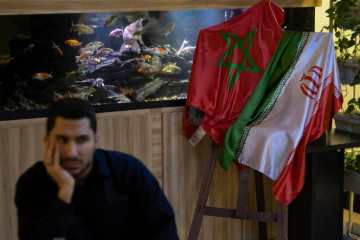

During Eid Al-Adha, Iran’s Foreign Minister Hossein Amir-Abdollahian said Tehran would welcome the normalisation of relations with the “brotherly country of Morocco” after nearly two years of a diplomatic crisis between both states.
Since then, Rabat has left Tehran’s extended hand hanging with no official comment on the invitation to reconcile ties.
“A significant factor for Rabat would be Iran's ability to acknowledge and rectify any past missteps that may have strained relations,” Moroccan political researcher Soufian El-Hamdaoui told The New Arab.
Morocco and Iran have been at odds with each other for years. In 2018, Moroccan Foreign Minister Nasser Bourita announced that Rabat was cutting diplomatic ties with Tehran over its support for the Polisario Front, a pro-independence movement challenging Moroccan sovereignty in the disputed Western Sahara.
"Morocco and Iran have been at odds with each other for years. In 2018, Rabat cut diplomatic ties with Tehran over its support for the Polisario Front"
According to Rabat, the Algeria-backed group received financial support through the Iranian embassy in Algiers and military training via a Tehran-backed Hezbollah proxy.
All of the accused parties strongly denied the claims, but the Arab League, Qatar, Saudi Arabia, Bahrain, the UAE, and Egypt all expressed support for Morocco’s decision at the time.
With Riyadh, formerly the leading anti-Iran actor in the region, now mending ties with its old archenemy, will Rabat be ready to turn the page, and at what cost?
Diplomatic bad blood
The animosity between the two states can be traced back to 1979 when the Moroccan king allowed Iran’s former Shah, Mohammed Reza Pahlavi, to flee to Morocco after the 1979 Iran revolution. This was the first sign of tension between Rabat and the new leadership in the Islamic Republic of Iran.
It was in 2009 when Rabat and Tehran first cut off ties. This time, it was over Morocco’s support for Bahrain in its historical conflict with Tehran - a position most Arab League’s members took at the time. Iran, however, was furious with Rabat’s “inappropriate position”, leading to an eight-year-long diplomatic stalemate.
The longest diplomatic relationship Tehran and Rabat maintained lasted for around 18 months, from January 2017 to May 2018.
Besides its alleged support for the Polisario Front, Tehran was also “threatening the spirituality of Morocco and Africa,” Morocco’s Foreign Minister claimed.
|
|
“The Moroccan government viewed Iran’s missionary work among its youth as a means to undermine government authority by indoctrinating young Moroccans to reject the moderate Sunni Islam practised in Morocco in favour of the radical Shia Islam of the Iranian regime,” said Moroccan FM Nasser Bourita in an interview with Breitbart in 2018.
Morocco, a Muslim Sunni state, has a small Shia minority that is not officially recognised. It is difficult to collect reliable figures about their numbers, though estimates go as high as 7,000. Those Shias have tended to take up the faith after returning from education or migrant work in the Levant.
Rabat’s officials have reportedly been worried about the pro-Iran political ideology the minority sometimes adopts.
In 2016, Moroccan media said the leader of the Shia minority in Morocco, Driss Hani, was received by Syrian President Bashar Al-Assad in Damascus on the sidelines of the ‘Arab and Islamic Rally for Support for Resistance’.
Sunni Moroccan leaders also say Iran’s efforts to convert Moroccan Muslims to Shiism will inflame sectarian strife in the country.
"Rabat is shuffling its diplomacy cards, deciding that friendship can only be proved via a clear position on the Western Sahara conflict"
Tehran or Tel Aviv?
For decades, North African frenemies Algeria and Morocco have stood in opposite ideological camps.
Rabat was pro-Western, and especially pro-American, on foreign policy. Algeria, meanwhile, has been a loyal ally to Russia since the Soviet Union provided military assistance to the country in its war of independence from France.
Today, however, Rabat is shuffling its diplomacy cards, deciding that friendship can only be proved via a clear position on the Western Sahara conflict.
Moroccan political analyst Soufian El-Hamdaoui argues that Tehran has, at a minimum, to take a position against the Polisario Front in order “to win Rabat’s trust and foster the potential for a mutually beneficial partnership between the two countries”.
Berlin and Madrid walked the same road to reconcile with Rabat over the past two years, ending their conflict with the Kingdom by voicing support for Morocco’s autonomy plan in Western Sahara. Thus, Tehran, long a friend of Algeria, joining the pro-Morocco club is not unlikely.
However, one critical issue may sabotage Tehran and Rabat’s potential friendship: Tel Aviv.
When Algeria cut off ties with Rabat in 2021 over Morocco’s normalisation with Israel, Tehran strongly supported Algiers’ decision to “protect its borders” after “Rabat’s betrayal and a stab in the back” of the Palestinians.
But today Tehran seems ready to overlook Moroccan-Israeli normalisation, which was further boosted this week when Tel Aviv recognised Rabat’s sovereignty over the disputed territory of Western Sahara.
“From a Western perspective, Iran has often been viewed as a regional threat in the MENA region. (...) This fear has been exploited by the West, led by the US (...). Today, Tehran is trying to turn the table,” a Rabat-based researcher told TNA.
Iran's mission now is to gain the region’s trust, build ties, and become a key player and influencer in MENA’s diplomacy and politics, argues further the analyst.
Basma El Atti is The New Arab's correspondent in Morocco.
Follow her on Twitter: @elattibasma




 Follow the Middle East's top stories in English at The New Arab on Google News
Follow the Middle East's top stories in English at The New Arab on Google News


